过去完成时
图片预览
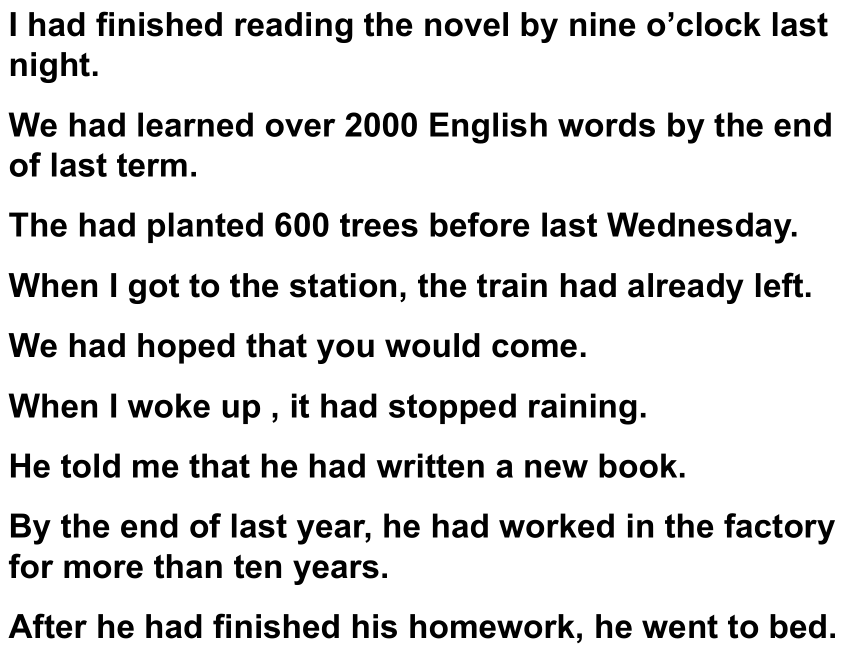

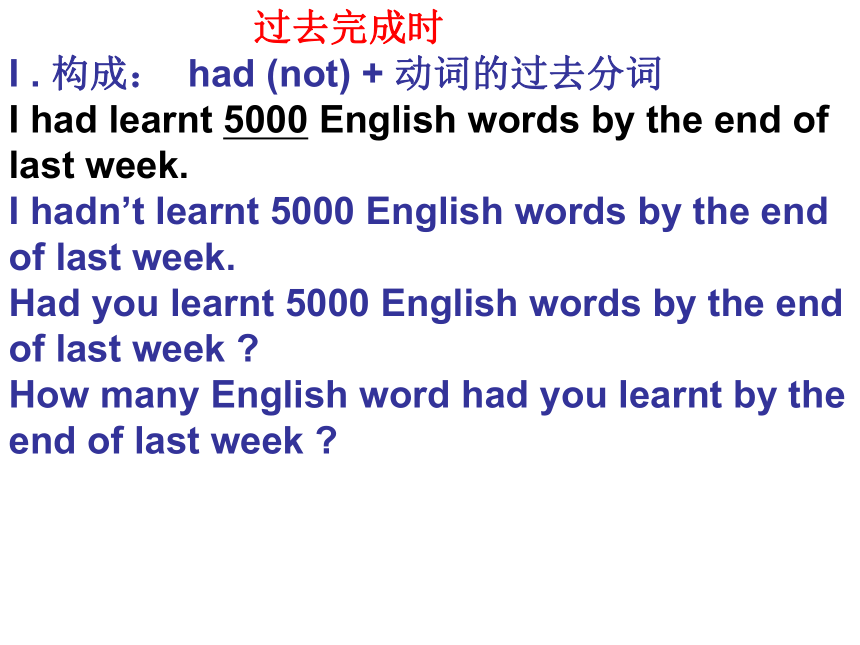
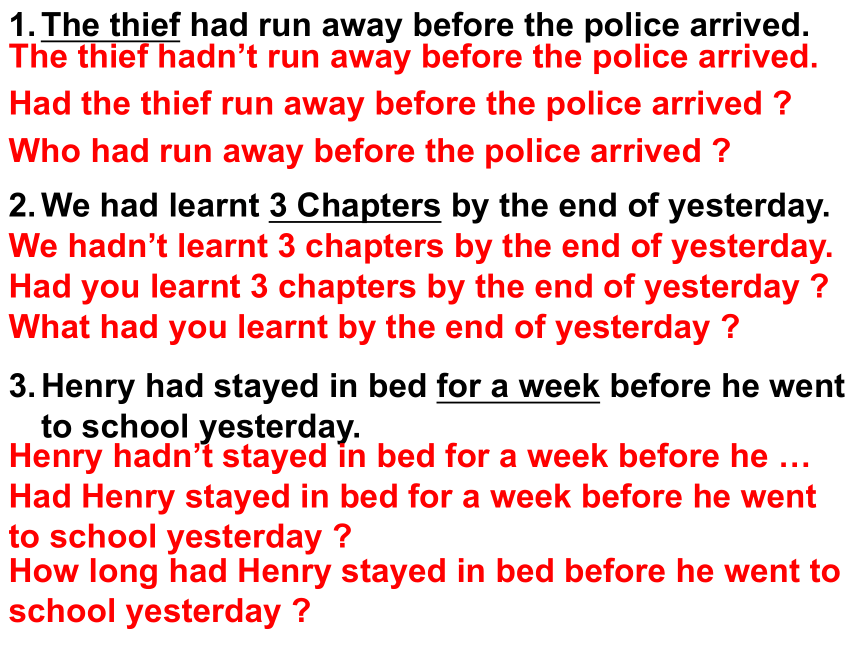
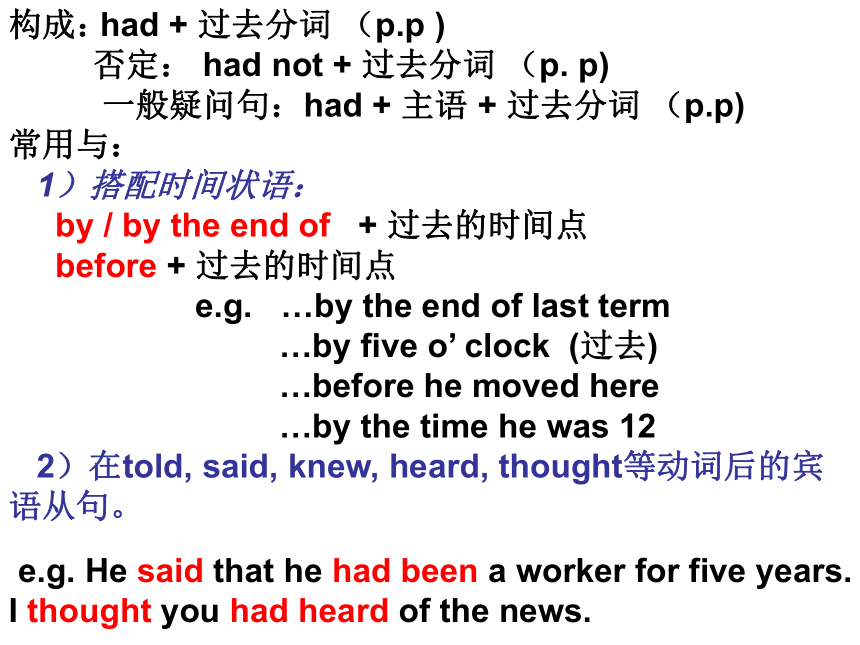
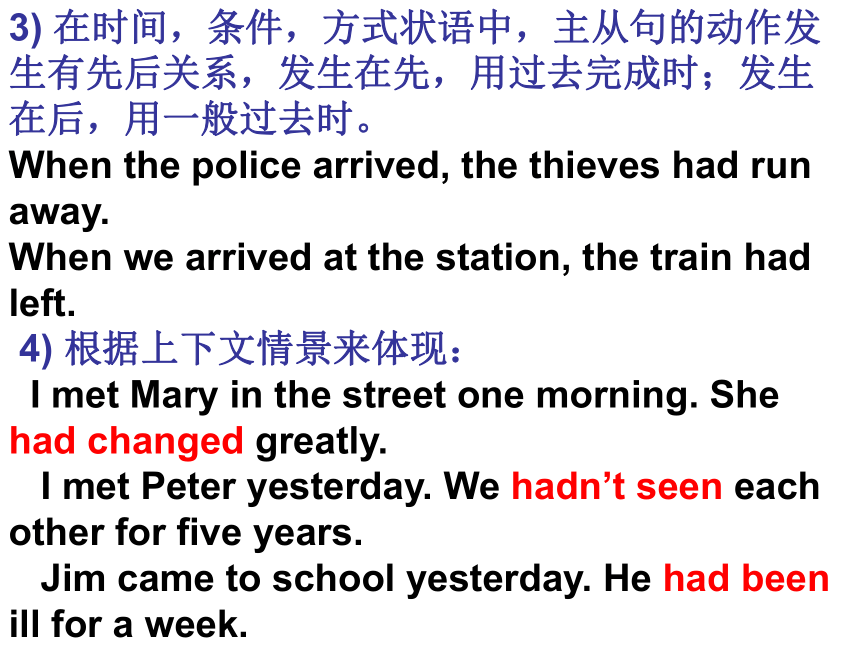
文档简介
(共13张PPT)
I had finished reading the novel by nine o’clock last night.
We had learned over 2000 English words by the end of last term.
The had planted 600 trees before last Wednesday.
When I got to the station, the train had already left.
We had hoped that you would come.
When I woke up , it had stopped raining.
He told me that he had written a new book.
By the end of last year, he had worked in the factory for more than ten years.
After he had finished his homework, he went to bed.
Past Perfect tense
过去完成时
I . 构成: had (not) + 动词的过去分词
I had learnt 5000 English words by the end of last week.
I hadn’t learnt 5000 English words by the end of last week.
Had you learnt 5000 English words by the end of last week
How many English word had you learnt by the end of last week
The thief had run away before the police arrived.
We had learnt 3 Chapters by the end of yesterday.
Henry had stayed in bed for a week before he went to school yesterday.
The thief hadn’t run away before the police arrived.
Had the thief run away before the police arrived
Who had run away before the police arrived
We hadn’t learnt 3 chapters by the end of yesterday.
Had you learnt 3 chapters by the end of yesterday
What had you learnt by the end of yesterday
Henry hadn’t stayed in bed for a week before he …
Had Henry stayed in bed for a week before he went to school yesterday
How long had Henry stayed in bed before he went to school yesterday
构成:
否定: had not + 过去分词 (p. p)
一般疑问句:had + 主语 + 过去分词 (p.p)
常用与:
1)搭配时间状语:
by / by the end of + 过去的时间点
before + 过去的时间点
e.g. …by the end of last term
…by five o’ clock (过去)
…before he moved here
…by the time he was 12
2)在told, said, knew, heard, thought等动词后的宾语从句。
e.g. He said that he had been a worker for five years.
I thought you had heard of the news.
had + 过去分词 (p.p )
3) 在时间,条件,方式状语中,主从句的动作发生有先后关系,发生在先,用过去完成时;发生在后,用一般过去时。
When the police arrived, the thieves had run away. When we arrived at the station, the train had left.
4) 根据上下文情景来体现:
I met Mary in the street one morning. She had changed greatly.
I met Peter yesterday. We hadn’t seen each other for five years.
Jim came to school yesterday. He had been ill for a week.
过去完成时和现在完成时的区别:
过去完成时表示动作发生在过去的过去; 现在完成时表示动作发生在过去的某个时间,但他的结果对现在仍有影响(I have finished the work.) 或者是动作发生在过去,现在刚刚结束或者仍在继续(I have worked here for 5 years.)
过去分词的构成:
1. 规则动词的变化 (regular verbs ):
a) 一般情况下在动词后面加 ed
work ------ worked
play -------- played
b) 以 e 结尾的动词直接加 d
use ------ used
refuse ------ refused
c) 以辅音字母加 y 结尾的动词,把 y 改 i 再加 ed
study ----- studied
carry ----- carried
d) 以重读闭音节结尾的,前面有单个元音字母时,双写辅音字母,再加 ed
stop ---- stopped
drop ------- dropped
过去完成时的构成:由助动词had + 动词的过去分词(V.pp)
admit - admitted
beg-begged
drop; prefer; plan;
Irregular verbs :
write
forget
eat
have
find
know
break
run
drink
Lose
cut
fly
wrote written
forgot forgotten
ate eaten
had had
found found
knew known
broke broken
ran run
drank drunk
lost lost
cut cut
flew flown
already(已经), just (刚刚)通常用于陈述句中;
ever通常用于一般疑问句中;
Have you ever done sth
yet 通常用于否定句中。
For + 时间段
Since + 时间点
________ last year;
________ she came to the company;
_________ two hours;
_________ ten years;
_________ 1980; _________ the beginning of this month
_________a long time;
___________ I moved to Shenzhen;
__________ a short while;
since
since
for
for
since
since
for
since
for
B2:
1, he had been a policeman for six years.
2. We hadn’t met each other since 2007.
3. He had been ill for a week.
4. Peter had waited for John for three years.
5. I had searched for her for two years.
1. The children ran away after they ___________ (break) the window.
had broken
2. Annie told me that his father ____________ ( go ) to Paris and he ____________ ( come ) back in a few days.
had gone
would come
3. My friend __________ (buy) the car two years ago. He __________ (buy) it for two years.
4. I have finished my homework .
When ______ you ______ it (finish)
5. Lucy, _______ you ______ your ticket (find) Not yet.
6. The people ______ already ______ (put) out the fire when the firemen got there.
7. When I came back home, I found that my father _____ ________ (be) back.
8. Mr Smith ________ (give) a talk on country music next Monday.
bought
has had
did
finish
have
found
had
put
had
been
will give
I had finished reading the novel by nine o’clock last night.
We had learned over 2000 English words by the end of last term.
The had planted 600 trees before last Wednesday.
When I got to the station, the train had already left.
We had hoped that you would come.
When I woke up , it had stopped raining.
He told me that he had written a new book.
By the end of last year, he had worked in the factory for more than ten years.
After he had finished his homework, he went to bed.
Past Perfect tense
过去完成时
I . 构成: had (not) + 动词的过去分词
I had learnt 5000 English words by the end of last week.
I hadn’t learnt 5000 English words by the end of last week.
Had you learnt 5000 English words by the end of last week
How many English word had you learnt by the end of last week
The thief had run away before the police arrived.
We had learnt 3 Chapters by the end of yesterday.
Henry had stayed in bed for a week before he went to school yesterday.
The thief hadn’t run away before the police arrived.
Had the thief run away before the police arrived
Who had run away before the police arrived
We hadn’t learnt 3 chapters by the end of yesterday.
Had you learnt 3 chapters by the end of yesterday
What had you learnt by the end of yesterday
Henry hadn’t stayed in bed for a week before he …
Had Henry stayed in bed for a week before he went to school yesterday
How long had Henry stayed in bed before he went to school yesterday
构成:
否定: had not + 过去分词 (p. p)
一般疑问句:had + 主语 + 过去分词 (p.p)
常用与:
1)搭配时间状语:
by / by the end of + 过去的时间点
before + 过去的时间点
e.g. …by the end of last term
…by five o’ clock (过去)
…before he moved here
…by the time he was 12
2)在told, said, knew, heard, thought等动词后的宾语从句。
e.g. He said that he had been a worker for five years.
I thought you had heard of the news.
had + 过去分词 (p.p )
3) 在时间,条件,方式状语中,主从句的动作发生有先后关系,发生在先,用过去完成时;发生在后,用一般过去时。
When the police arrived, the thieves had run away. When we arrived at the station, the train had left.
4) 根据上下文情景来体现:
I met Mary in the street one morning. She had changed greatly.
I met Peter yesterday. We hadn’t seen each other for five years.
Jim came to school yesterday. He had been ill for a week.
过去完成时和现在完成时的区别:
过去完成时表示动作发生在过去的过去; 现在完成时表示动作发生在过去的某个时间,但他的结果对现在仍有影响(I have finished the work.) 或者是动作发生在过去,现在刚刚结束或者仍在继续(I have worked here for 5 years.)
过去分词的构成:
1. 规则动词的变化 (regular verbs ):
a) 一般情况下在动词后面加 ed
work ------ worked
play -------- played
b) 以 e 结尾的动词直接加 d
use ------ used
refuse ------ refused
c) 以辅音字母加 y 结尾的动词,把 y 改 i 再加 ed
study ----- studied
carry ----- carried
d) 以重读闭音节结尾的,前面有单个元音字母时,双写辅音字母,再加 ed
stop ---- stopped
drop ------- dropped
过去完成时的构成:由助动词had + 动词的过去分词(V.pp)
admit - admitted
beg-begged
drop; prefer; plan;
Irregular verbs :
write
forget
eat
have
find
know
break
run
drink
Lose
cut
fly
wrote written
forgot forgotten
ate eaten
had had
found found
knew known
broke broken
ran run
drank drunk
lost lost
cut cut
flew flown
already(已经), just (刚刚)通常用于陈述句中;
ever通常用于一般疑问句中;
Have you ever done sth
yet 通常用于否定句中。
For + 时间段
Since + 时间点
________ last year;
________ she came to the company;
_________ two hours;
_________ ten years;
_________ 1980; _________ the beginning of this month
_________a long time;
___________ I moved to Shenzhen;
__________ a short while;
since
since
for
for
since
since
for
since
for
B2:
1, he had been a policeman for six years.
2. We hadn’t met each other since 2007.
3. He had been ill for a week.
4. Peter had waited for John for three years.
5. I had searched for her for two years.
1. The children ran away after they ___________ (break) the window.
had broken
2. Annie told me that his father ____________ ( go ) to Paris and he ____________ ( come ) back in a few days.
had gone
would come
3. My friend __________ (buy) the car two years ago. He __________ (buy) it for two years.
4. I have finished my homework .
When ______ you ______ it (finish)
5. Lucy, _______ you ______ your ticket (find) Not yet.
6. The people ______ already ______ (put) out the fire when the firemen got there.
7. When I came back home, I found that my father _____ ________ (be) back.
8. Mr Smith ________ (give) a talk on country music next Monday.
bought
has had
did
finish
have
found
had
put
had
been
will give
同课章节目录
- 词法
- 名词
- 动词和动词短语
- 动词语态
- 动词时态
- 助动词和情态动词
- 非谓语动词
- 冠词
- 代词
- 数词和量词
- 形容词副词及其比较等级
- 介词和介词短语
- 连词和感叹词
- 构词法
- 相似、相近词比较
- 句法
- 陈述句
- 一般疑问句和否定疑问句
- 特殊疑问句及选择疑问句
- 反意疑问句
- 存在句(There be句型)
- 宾语从句
- 定语从句
- 状语从句
- 主谓一致问题
- 简单句
- 并列句
- 复合句
- 主谓一致
- 主、表语从句
- 名词性从句
- 直接引语和间接引语
- 虚拟语气
- 感叹句
- 强调句
- 倒装句
- 祈使句
- 句子的成分
- 句子的分类
- 题型专区
- 单项选择部分
- 易错题
- 完形填空
- 阅读理解
- 词汇练习
- 听说训练
- 句型转换
- 补全对话
- 短文改错
- 翻译
- 书面表达
- 任务型阅读
- 语法填空
- 其他资料
